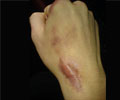A new study by researchers at Ohio State University has shown that omega-3 fatty acids found in fish oils may have a detrimental effect on the healing process of small, acute wounds in human skin.
Omega-3 fatty acids found in fish oils may have a detrimental effect on the healing process of small, acute wounds in human skin, according to a new study by researchers at Ohio State University.
The omega-3 fatty acids are widely considered to benefit cardiovascular health and other diseases related to chronic inflammation because of their anti-inflammatory properties.However, insufficient inflammation during the initial stage of wound healing may delay the advancement of later stages.
For the study, participants were divided into two groups of 15 healthy adults each. One group took a placebo, and the other took an active supplement containing 1.6 grams of eicosapentaenoic acid (EPA) and 1.1 grams of docosahexaenoic acid (DHA) daily for four weeks.
EPA and DHA are the polyunsaturated fatty acids obtained primarily from fish oil that serve as the basis of most standard omega-3 supplements.
Previous study has suggested that these fatty acids affect the production of proteins called proinflammatory cytokines, which signal biological processes during the inflammatory stage of wound healing.
The primary cytokines in the process are interleukin-1 beta (IL-1b), interleukin-6 (IL-6) and tumour necrosis factor-alpha (TNF-a).
Advertisement
McDaniel and colleagues expected to find that research participants taking the fish oil supplements - and therefore being affected by their anti-inflammatory properties - would have significantly lower levels of the cytokines in their blister wounds during the initial stage of inflammation, resulting in a slower healing process.
Advertisement
The active group also had higher levels of IL-6 and TNF-a cytokines in their blisters over time than did the placebo group, but those differences in levels were not significant.
The blisters took an average of 10.7 days to completely heal in the active supplement group and an average of 9.8 days in the placebo group, but the difference was not significant.
McDaniel said the results suggest that the function of these cytokines still isn't completely understood. And the scientists were also surprised to find that gender appeared to make a difference in cytokine production.
Men were more likely than women among the active supplement group to have higher levels of the IL-1b cytokine in their wounds.
"These proteins may have other functions that we don't yet fully understand. And our results also suggested there could be a difference between men and women in the amount of inflammatory proteins that are produced, because on average, women had lower levels of one of the proteins," Jodi McDaniel, lead author of the study and an assistant professor of nursing at Ohio State University. We're just trying to figure out how to evaluate what omega-3s do and how to advise people to take these supplements. Our goal isn't to stop supplement use but to fill in the picture of what conditions they help and what they might hurt," she added.
The study is published in a recent issue of the journal Wound Repair and Regeneration.
Source-ANI
RAS/L















